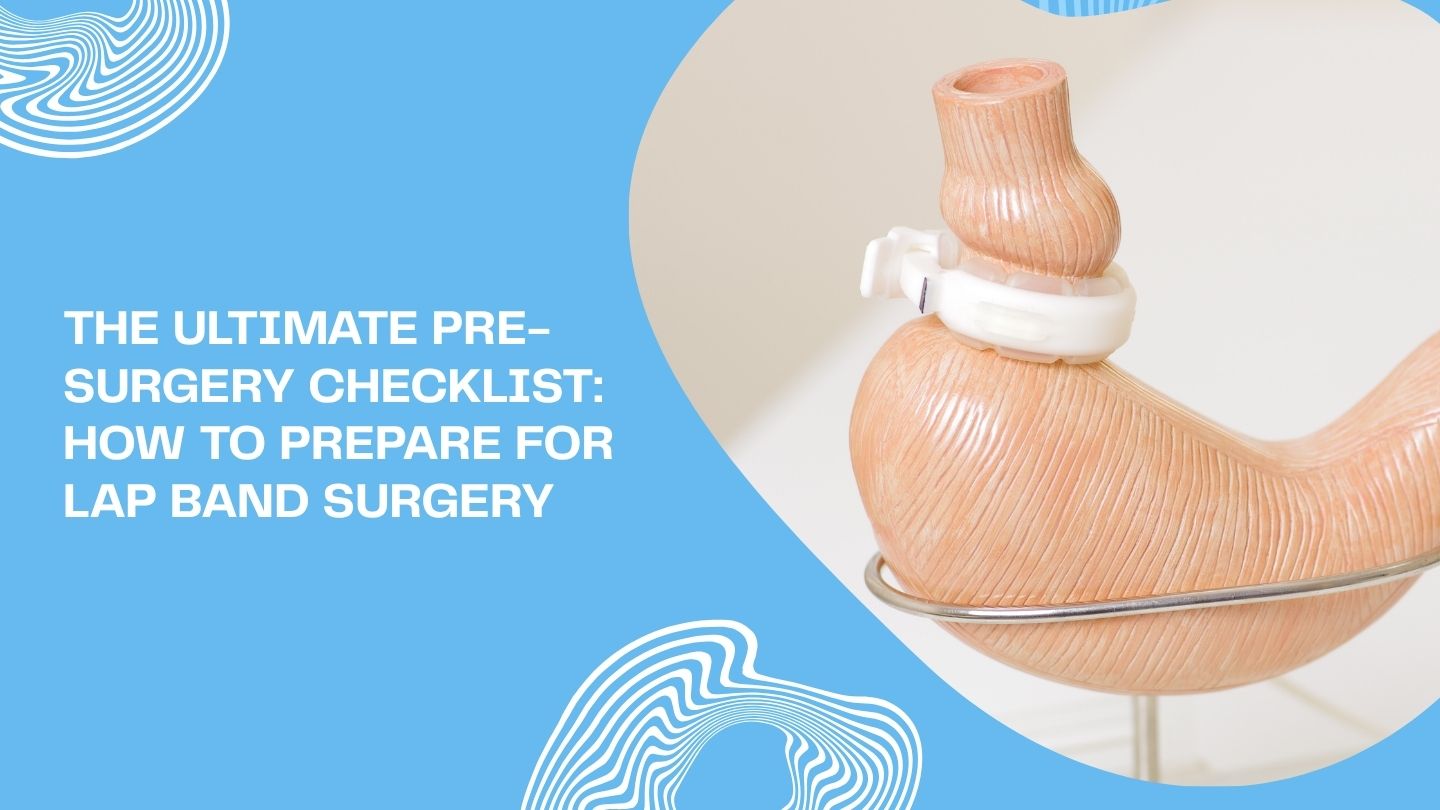
The Ultimate Pre-Surgery Checklist: How to Prepare for Lap Band Surgery
Preparing for lap band surgery requires thoughtful planning and adherence to medical guidance to achieve the best possible outcome. From lifestyle adjustments and nutritional changes to preoperative evaluations, every step plays a vital role in ensuring surgical success and a smooth recovery. Proper preparation also helps reduce complications and promotes long-term weight management success. In this blog, we’ll outline the essential steps patients should take before undergoing this procedure.
Key Takeaways
- Initial consultation with a certified bariatric surgeon is essential for understanding the lap band surgery process and evaluating mental readiness.
- A specialized pre-surgery diet plan is crucial for reducing liver size and preparing the body for surgery, often involving calorie restrictions and hydration.
- Adjustments to medications and lifestyle changes, such as quitting smoking and reducing alcohol intake, significantly improve surgical outcomes and recovery.
Initial Consultation and Evaluations
The first step on your lap band surgery journey is a consultation with a certified bariatric surgeon. This meeting allows you to discuss your expectations, ask questions, and understand the procedure better. Your surgeon will offer insights into what to expect before, during, and after the surgery, helping you gain clarity by understanding the lap band surgery and how to prepare effectively for the procedure.
A key aspect of this initial phase is undergoing psychological evaluations to assess your mental preparedness for the changes ahead. These assessments are about gauging your readiness and ensuring you have the right mindset for this major life change. A multidisciplinary team, including dietitians and psychologists, collaborates to comprehensively evaluate your readiness for surgery.
Pre-operative assessments, such as blood tests and imaging, are necessary to ensure your optimal health before surgery. These tests help identify underlying health conditions that need addressing to avoid complications during and after surgery.
Pre-Surgery Diet Plan
Preparing for lap band surgery involves adopting a specialized diet plan to ready your body for the procedure. The pre-surgery diet, often called the liver reduction diet, is important as it lowers calorie intake by reducing carbohydrates and fats, decreasing the size of the liver. This reduction makes your liver easier to maneuver during laparoscopic surgery, thereby preventing complications.
Your bariatric surgeon will usually offer several diet options, each targeting a daily intake of 800-1000 calories with less than 100 grams of carbohydrates and high protein. Common options include meal replacement shakes, a skim milk and yogurt diet, or a balanced food-based diet focused on low carbohydrates and fats. The goal is to consume a diet that supports weight loss while preparing your body for surgery, considering how much food you need to meet these requirements.
Increasing fluid intake to at least 2 liters per day is also crucial in the pre-surgery diet plan. Staying hydrated helps your body function optimally and supports liver size reduction. Avoid sugary drinks as they can counteract the benefits of your diet.
Adhering to these dietary guidelines sets a solid foundation for successful solid foods surgery and recovery.
Medication Adjustments
Adjusting your medication regimen is another crucial step in preparing for lap band surgery. Key points to consider include:
- Inform your surgeon about all the medications you are currently taking.
- Pay special attention to anticoagulants like blood thinners.
- These medications may need to be paused before surgery to minimize the risk of bleeding complications.
Discuss over-the-counter supplements, including herbal remedies, with your surgeon, as they may interfere with the surgery. Discontinue common pain relievers like aspirin and ibuprofen, classified as non-steroidal anti-inflammatory drugs (NSAIDs), several days before the procedure to lower the chance of complications.
These adjustments can significantly reduce the risk of possible complications and ensure a smoother surgical procedure experience for surgeons.
Lifestyle Changes
Lifestyle changes play a pivotal role in preparing for lap band surgery and ensuring successful recovery. One of the most crucial changes is smoking cessation. Tobacco use can impede healing and recovery after surgery, so quitting smoking before the procedure is essential.
Reducing alcohol consumption is also important. Bariatric patients process alcohol differently, intensifying its effects and hindering recovery. Reducing alcohol drinking enhances your body’s ability to heal and maintain long-term health after surgery.
These lifestyle changes improve recovery time and success rates for individuals undergoing lap band surgery. Embracing a healthier lifestyle, including quitting smoking and reducing alcohol consumption, sets the stage for a more effective recovery process.
Preparing for Hospital Stay

Preparing for your hospital stay involves practical steps to ensure you’re comfortable and well-equipped for your time in the hospital. Typically, patients can expect a hospital stay of one to two days after lap band surgery.
Pack a hospital bag with comfortable clothing and personal hygiene items to make your stay pleasant. Arrange reliable transportation to and from the hospital, as you won’t be able to drive post-surgery.
These preparations help you focus on recovery without worrying about logistics.
Day Before Surgery
The day before your lap band surgery is crucial to prepare your body for the procedure. Eat lightly and stop all food and fluid intake after midnight to ensure your stomach is empty for surgery.
A thorough shower with soap and water the night before surgery reduces the risk of infection. If your surgeon recommends anti-embolism stockings, have them ready. These simple steps help avoid complications and set the stage for successful surgery, including the prevention of blood clots.
The Morning of Surgery
On the morning of your lap band surgery, arrive at the hospital on time to ensure all pre-operative procedures can be carried out smoothly. Being punctual helps the medical team prepare you for surgery without delays.
You will receive general anesthesia to ensure you are unconscious and comfortable during the surgery. Laparoscopic gastric banding, the lap band procedure for lap band surgery, involves making small cuts in the abdomen and using laparoscopic instruments to place an adjustable gastric band around the stomach. This procedure is also known as laparoscopic adjustable gastric banding and includes laparoscopic adjustable gastric band procedures, which may be necessary after major surgery and bariatric procedures, including lap band conversion.
This technique offers the benefits of improved recovery time and a shorter hospitalization duration.
Post-Surgery Care Plan

After your lap band surgery, a structured post-surgery care plan is essential for a smooth recovery. Manage pain at the incision site with oral medications, taken regularly rather than waiting for the pain to worsen.
Follow-up appointments with your bariatric surgery team are usually scheduled at two to three weeks, and then regularly for the first year. These check-ins are crucial for monitoring progress and making necessary adjustments to your care plan.
A supportive network of family and friends can significantly enhance your recovery process. They can assist with meal preparation, help you stick to exercise routines, and provide emotional encouragement. Hospitalization usually lasts one to two days after surgery, so planning for support at home is crucial.
Long-Term Success Strategies
Achieving long-term success after lap band surgery requires commitment to several key strategies, beginning with recognizing the lap band surgery requirements to ensure you meet all medical and lifestyle criteria before proceeding. Regular dietary assessments ensure you adhere to nutritional guidelines and prevent deficiencies. Tailored nutritional supplements post-surgery can support weight loss and overall health.
Engaging in at least 60 minutes of moderate to vigorous physical activity daily is vital for maintaining weight loss and preventing inadequate weight loss, contributing to the average weight loss goals of individuals who carry enough weight to lose weight. When people lose weight, it is essential to avoid strenuous activities and lifting heavy objects for three to six weeks post-surgery to support healing and achieve their weight loss goals.
Celebrating small milestones in recovery can boost motivation and reinforce commitment to your health journey. Self-monitoring your food intake, like keeping food diaries, is linked to better weight management after surgery. Focusing on long-term health goals is essential, as recovery includes ups and downs that require a positive outlook.
Support System
A strong support system is vital for success after lap band surgery. Emotional encouragement from family and friends helps navigate feelings of anxiety and vulnerability. Addressing psychological issues like depression and low self-esteem can prevent weight regain after surgery.
Regular consultations with healthcare professionals significantly improve weight loss outcomes. Wellstar is recognized for high-quality care and provides comprehensive support throughout your weight loss journey, addressing issues related to obesity, so you don’t lose sight of your goals.
Preparing for a Successful Surgical Journey
Being well-prepared before lap band surgery is crucial for ensuring a safe procedure, smoother recovery, and lasting weight loss success. By following medical instructions, maintaining a healthy diet, and adopting positive lifestyle habits early, patients can minimize complications and enhance post-surgery results. A structured preparation plan also helps promote confidence and readiness for the transformative journey ahead.
At Wellstar Comprehensive Bariatric Services, our experienced lap band surgeon in East Cobb, Marietta, Smyrna, and Austell provides comprehensive pre-surgery guidance and ongoing support tailored to each patient’s needs. We focus on education, preparation, and personalized care to help you achieve optimal surgical outcomes and long-term wellness. Trust us to guide you every step of the way toward a healthier, more balanced life.
Frequently Asked Questions
How long does recovery take after lap band surgery?
Most patients return to normal daily activities within one to two weeks after lap band surgery. However, complete recovery and adjustment to new eating habits may take several months, depending on individual healing and adherence to post-surgical guidelines.
What foods should I avoid after lap band surgery?
Immediately following surgery, patients should avoid high-fat, high-sugar, and carbonated foods or beverages. Gradually reintroducing soft foods under the guidance of your bariatric team ensures proper healing and long-term dietary success.
Can the lap band be adjusted after surgery?
Yes. The lap band can be adjusted during follow-up appointments to help regulate restriction levels and optimize weight loss. Adjustments are typically made based on your progress and comfort.
How much weight can I expect to lose with lap band surgery?
Weight loss results vary, but patients typically lose 40–60% of their excess weight within the first two years after surgery. Consistent adherence to diet, exercise, and follow-up care is key to achieving optimal results.
